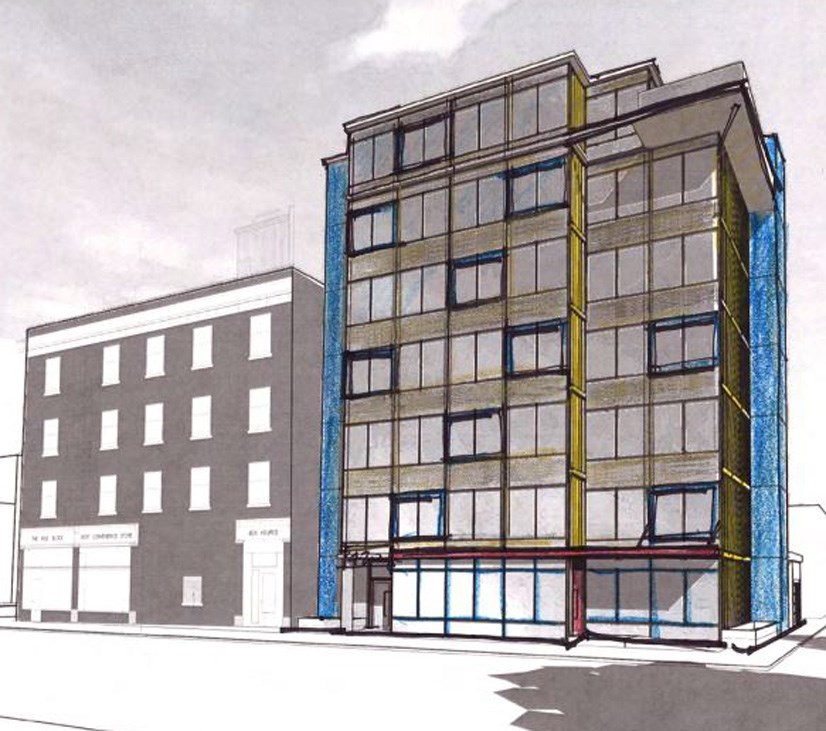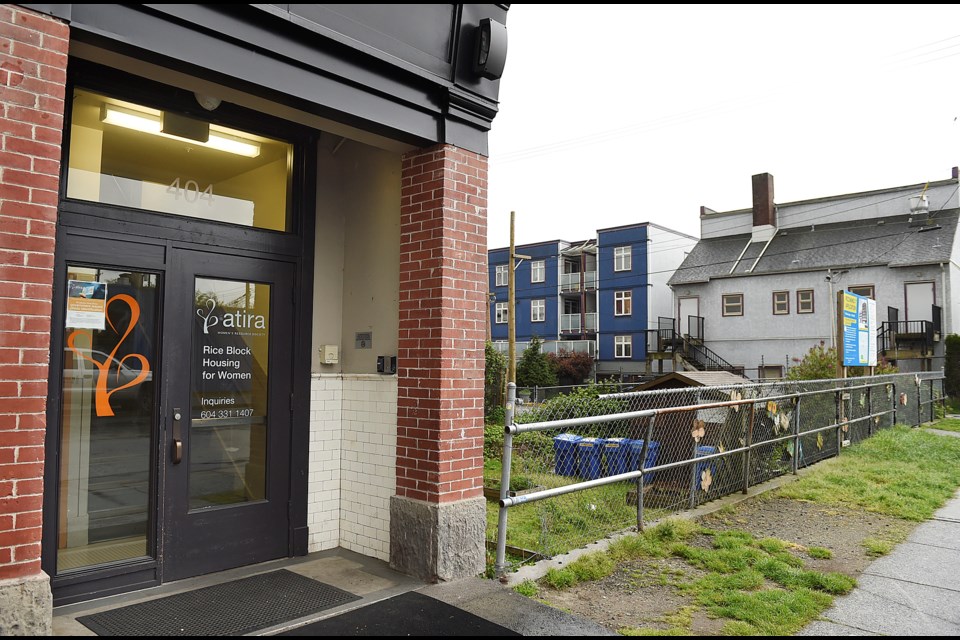A chain-link fence surrounds the vacant lot at 420 Hawks Ave., located just off Hastings Street. On one side of the Strathcona property sits the Rice Block — a 38-unit single-room occupancy hotel for women that Atira has run since 2007, while across the alley, at Pender Street, is the Ukrainian Hall.
The fate of the lot, which is currently being used by Atira as a community garden, rests on the outcome of a rezoning application filed more than a year ago.
Atira bought the land in 2009. The non-profit now hopes to construct a seven-storey building made out of shipping containers on the site, but its application continues to meet resistance within the neighbourhood, although a revised application filed last October addresses some of the negative feedback.
While the initial application envisioned 26 social housing units for women and children (20 studios and six two-bedroom units), the new proposal scales back the number of units to 21, with more family housing (14 two-bedroom units, and seven micro-dwelling units), as well as expanded amenity space at street level that’s accessible to the community.

Neighbourhood organizations aren't satisfied, so they launched an online petition challenging the proposal just over a month ago — it’s earned 75 signatures so far.
The organizations behind the petition — the Coalition of Strathcona Community Groups — include the Ukrainian Cultural Centre, the Strathcona Residents’ Association, the Inner City Safety Society, the Strathcona Business Improvement Association and Stamps Place Tenants Council.
Elana Zysblat, a Strathcona Residents’ Association spokesperson, says the neighbourhood should have more say in the building’s design.
She says there should be even fewer units, those units should larger and that while more social housing is “desperately needed” for vulnerable women and children, the proposed design is a “recipe for failure.”
“If we are designing social housing from scratch, designing housing with all the knowledge and technology we have today, then it should be designed for human beings in a way that they can thrive. So it shouldn’t be ridiculously small, ridiculously limited, no storage, no outdoor space, no flexibility,” she said.
“These are all elements of Atira’s design for this property and it’s just a recipe for failure. People who are starting in already challenged, just getting off the street or just trying to make ends meet, are not going to thrive in this type of design.”
Zysblat also questions Atira’s management style. She said there have been ongoing disturbances in the neighbourhood such as solicitation, violent incidents and screaming, which she said relate to the Rice Block.
The Ukrainian Hall logs concerns and now passes the information on to both Atira and the VPD.
When contacted, the Vancouver Police Department said officers have been called to the Rice Block nine times since January.
“We’re concerned Atira’s planning to add more people to a management model that they have that perhaps isn’t as supportive or as responsible as could be,” Zysblat said. “It’s very close to a park and an elementary school, a community centre, the Ukrainian Hall. And the people who live on that block, and in and around that block, feel really unsafe for themselves and for the women who live in that building.”
Atira considers the site a good location for the women and children it hopes to house because it’s close to parks, a school and a community centre.
In an interview last month, Atira executive director Janice Abbott told the Courier she talked with neighbourhood groups in the past about their concerns, such as there not being enough two-bedroom units and their desire for amenity or community space at the street level, and those concerns have been addressed.
“We were in discussions with them early. I thought we had met the initial requirements that they had set out. We did, in fact, meet the initial requirements they set out. Now they’ve got a different host of issues, so I’m not entirely sure they’re interested in anything we have to say,” she said.
Abbott said she’s not surprised by the petition and when asked if she planned to meet with the groups again, she said: “I’m not entirely certain that they’re willing to meet with me and I’m not entirely certain that they’re willing to have this project go forward no matter what we do.”
Abbott, who noted some residents have voiced support for the project, said the building can’t go below 21 units and still be viable. She maintains the housing units are much needed in the city.
“We have an enormous housing affordability problem in this city for everybody, and especially if you’re a women and you’re vulnerable, the housing options diminish dramatically,” she said. “So affordable housing is not just necessary, it’s critical across this city.”
The opposition has been “a little bit surprising,” according to Abbott, who noted that Atira has had little to no opposition with respect to women-only housing in the past.
“When we did our last project and we did our open houses, maybe three people showed up,” she said. “So this is a bit surprising. Is it frustrating? No. It’s part of the public process and you just have to go through it.”
Kevin McNaney, assistant director of planning for the downtown region, expects the rezoning application will be brought to council for referral to public hearing sometime in the next month or so.
There hasn’t been an open house since the October revisions, but he said there was a meeting with interested stakeholders in December, including the Strathcona Residents’ Association. The city is also receiving feedback from the public in written form. McNaney said the city is aware of the petition. Public input will be included in the report to council.
“We’re always concerned about what we hear from the public and I think that’s why we worked with Atira to adjust the application and look at the urban design impact, the architecture and the number of family units, because we heard from the Downtown Eastside plan and from [others] — the desire for family social housing,” he said.
@naoibh



